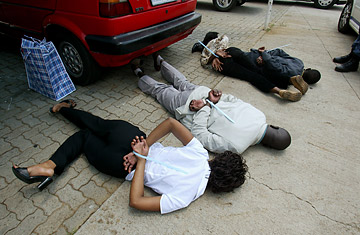
Two couples lie cuffed near their car after they were arrested by members of the South Africa Police Services for robbing a church in the northern suburbs of Johannesburg, South Africa.
Ncolela Phaliso becomes so angry during a quarrel with his brother and business partner, Godun, that he cuts off his sibling's tongue with a kitchen knife. Later, Ncolela's wife, Hlubi, is found with her throat slit and her breasts severed from her body. Although Godun is the prime suspect, no charge is laid, and the feuding brothers continue to run their Soweto-based security company together.
The story of the Phaliso brothers may sound like one of the dozens of daily crime reports in South Africa's newspapers, but they're fictional characters in Richard Kunzmann's latest novel, Dead-End Road, one of a score of new South African novels focused on crime. Just as violent crime remains a hot topic of headlines and social conversation, so has it become the hot literary genre in a society plagued by a daily surfeit of true-life horror stories.
New crime statistics released by the South African Police Service (SAPS) make grim reading: 19,202 murders; 52, 617 rapes; 12,761 home invasions; 13,599 carjackings; 92,021 aggravated robberies — and all of that just in the past year. And writers trying to make sense of that violent social landscape are turning increasingly to the crime genre. During the apartheid years, most would have found it unconscionable to write from a pro-police point of view, but the demise of apartheid has changed the equation. One of the new crime authors, Andrew Brown, whose Coldsleep Lullabye won the 2006 Sunday Times Literary Award for Fiction, was repeatedly arrested during the 1980s as a militant anti-apartheid activist. Twenty years on, he is a police reserve officer.
"Crime has become de-politicized," says Kunzmann, because unlike in the apartheid era where the law served the ends of racial domination, there is now a social consensus over what constitutes a crime. "Police officers [today] are officers of a law we all recognize."
Other crime writers concur: "It's now OK to write crime novels featuring the very cops who before had been seen as the soldiers of an invading army," says Mike Nicol, co-author with Joanne Hichens of Out to Score. "Crime writing is first and foremost about the two great human issues: mortality and morality. If you write about those two subjects you get to the heart and soul of a country, and so local crime writing is trying to make sense of this particularly vicious period of our history."
The topics raised in South African crime novels reflects the trends out on the streets. Margie Orford, author of Like Clockwork and Blood Rose, focuses on the endemic violence against women and children. "I think we are in a state of civil war against women and children and the perpetrators of violent crime are overwhelmingly male," she says. "There is a sense of unbridled misogyny and entitlement."
Other writers have tackled everything from vigilatism and muti killings (where a victim is killed for body parts to be used in witchcraft) to abalone smuggling and the murder of street children. In Nicol's latest novel, Payback, the protagonists are former gun-runners from the liberation struggle days. The new crime fiction captures the frustrations, fears and also optimism of a changing society, offering readers highly complex characters on both sides of the law. In South Africa, so long cast in black and white, capturing the shades of gray is the new challenge.
Angela Makholwa, author of the serial-killer thriller Red Ink, visited prisoners in Pretoria's notorious C-Max prison for research, and got more than she bargained for. "I established a relationship with one of these men, who happened to be one of the most vilified South African serial killers," she says. "The more I got to know him, the more conflicted I became about defining prime evil. Although I knew what he had done, I found my initial impression of him slowly peeling away."
And in Deon Meyer's latest offering, Devil's Peak, former freedom fighter Thobela Mpayipheli is on a vigilante revenge mission after his eight-year-old adopted son is gunned down. Is he the good guy or the bad guy? Kunzman reckons: "The relationship between criminals and the forces of the law is different. American and British crime fiction is largely about a society that is firmly in control, but which is momentarily imbalanced by an act of murder. In South Africa, that's wishful thinking."
So, too, is the sense of resolution and closure offered by dealing with crime via fiction. "It does feel very bleak and black sometimes, but crime is a fantasy genre, even while making social comment," says Orford. "The good guys win, just for a while."
